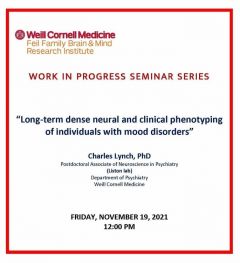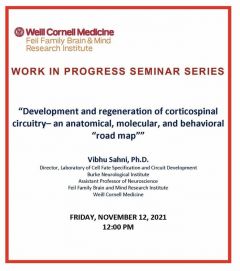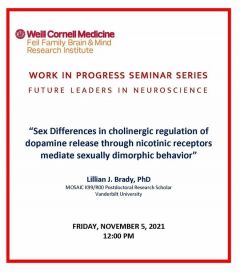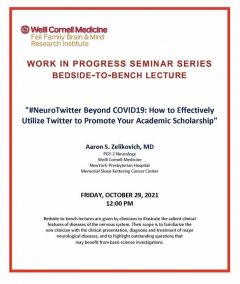Dec 10 2021 - 12:00pm to 1:00pm

Part of the Work in Progress (WIP) series
Li Fan, PhD, Senior Research Asscociate in Neuroscience (Gan Lab), Helen and Robert Appel Alzheimer's Disease Research Institute, BMRI, WCM
Dec 9 2021 - 4:00pm to 5:00pm
Location: Weill Auditorium

Gloria B. Choi, Ph.D.
Picower Institute for Learning and Memory Investigator
MIT Associate Professor
Abstract
Gloria Choi studies the interaction of the immune system with the brain and the effects of that interaction on neurodevelopment, behavior and mood. She also studies how social behaviors are regulated according to sensory stimuli, context, internal state, and physiological status, and how these factors modulate neural circuit function via a combinatorial code of classic neuromodulators...
Dec 3 2021 - 12:00pm to 1:00pm

Part of the Future Leaders in Neuorscience series
Eirene Markenscoff-Papadimitriou, PhD, Postdoctoral Fellow, UCSF
Dec 2 2021 - 4:00pm to 5:00pm
Location: Weill Auditorium

Andrew Yoo, Ph.D.
Associate Developmental Biology Professor
Washington University School of Medicine
Abstract
Yoo Lab researchers study neurogenic activities of microRNAs (miRNAs) and develop cellular reprogramming approaches to turn human fibroblasts directly to neurons without going through stem cell stages. Of particular importance for modeling late-onset disorders, direct neuronal conversion propagates cellular age stored in starting fibroblasts to generate human neurons that mimic the...
Nov 19 2021 - 12:00pm to 1:00pm

Part of the Work in Progress (WIP) series
Charles Lynch, PhD, Postdoctoral Associate of Neuroscience in Psychiatry (Liston lab), Department of Psychiatry, WCM
Nov 18 2021 - 4:00pm to 5:00pm

Part of the Progress in Neuroscience Seminar (PINS) series
Marco Prinz, M.D.
Medical Director, Professor of Neuropathology
Institute of Neuropathology
University of Freiburg
Abstract
The diseased brain hosts a heterogeneous population of myeloid cells, including parenchymal microglia, perivascular cells, meningeal macrophages and blood-borne monocytes. To date, the different types of brain myeloid cells have been discriminated solely on the basis of their localization, morphology and...
Nov 12 2021 - 12:00pm to 1:00pm

Part of the Work in Progress Seminar (WIP) series
Vibhu Sahni, PhD, Director, Laboratory of Cell Fate Specification and Circuit Development, Burke Neurological Institute, Assistant Professor of Neuroscience, BMRI, WCM
Nov 5 2021 - 12:00pm to 1:00pm

Part of the Work in Progress, Future Leaders in Neuroscience series
Lillian J. Brady, PhD, MOSAIC K99/R00 Postdoctoral Research Scholar, Vanderbilt University
Nov 4 2021 - 4:00pm to 5:00pm

Part of the Progress in Neuroscience Seminar (PINS) series
Mollie K. Meffert, M.D., Ph.D.
Associate Professor, Depts. of Biological Chemistry and Neuroscience, John Hopkins University, School of Medicine
Abstract
The Meffert lab studies mechanisms by which programs of gene expression are synchronously coordinated and maintained to underly enduring changes in brain function. One focus of our research investigates the upstream post-transcriptional processes, coordinated by RNA-binding...
Oct 29 2021 - 12:00pm to 1:00pm

Aaron S. Zelikovich, MD, PGY-2 Neurology, Weill Cornell Medicine, NewYork-Presbyterian Hospital, Memorial Sloan Kettering Cancer Center

